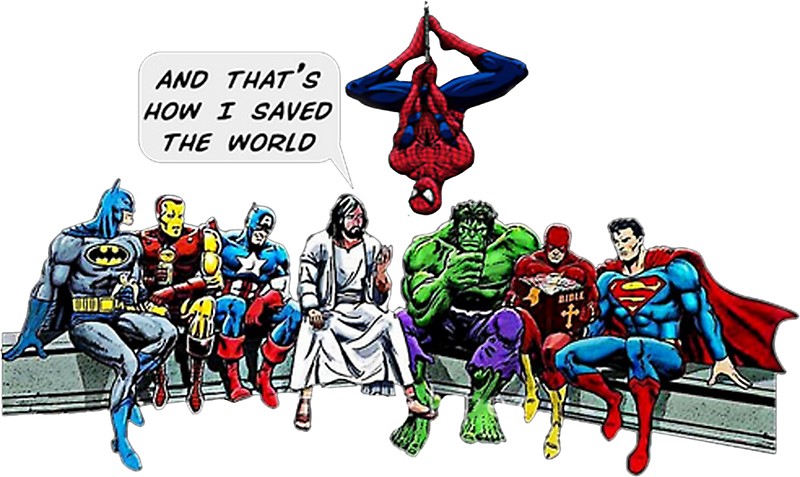The following article is Lesson 3 from my book, Superhero University: The Ultimate Superhero Training Manual:
Superheroes, having the correct understanding of what is good and right, are full of love, and they are compelled to act out from love. This is the only reason we can distinguish the hero from the villain. Spider-Man doesn’t save a falling person from splatting on the ground because he hates the person he saves, right? The superhero saves someone from danger/death because he/she has love for the person he/she is saving. In stark contrast, the villain performs acts of evil, not love. Again, evil is merely a privation of what is good; hatred is a privation or lack of love. It is written in James 2:8 that we are doing right by living a life of love toward others. But what is love?
Love is not something we can have or hold like materialists would like us to believe. Not everything in life can be boiled down to materialism. Think about it: Can you describe the physical features of love or even the thought about love? How much does love weigh? Of what is the love molecule comprised? There is no infinity stone of love we can possess that can be contained in a gauntlet. In fact, of all the infinity stones Thanos (from the Avengers) had been able to collect that provided him with seemingly unlimited power and ability, it is evident that he lacked love, and that is why he had no qualms about murdering half of the created creatures in the universe—including his own daughter! In fact, Thanos had to sacrifice love in order to be able to obtain one of the infinity stones. Ultimately, Thanos traded love for power because he could not possess both.
But what is love? And why do humans possess the capability to love? If love is not a material that can be weighed, or measured, how are humans able to possess love? How do we even know that love exists? Does love exist? We know that love exists—not because humans have defined the term—but because the Creator provided the definition of love and humans live by that defined divine design.
Think about this: Oxygen—the air we breathe—exists whether humanity believes in it or not. In fact, oxygen exists even if humans call it something else. Humanity never created or invented oxygen; we merely discovered it. Likewise, love exists whether humanity believes love exists or not. Love exists even if humans call it something else. In fact, the definition of love is so confused by many humans because they believe it to be something it is not. Many people misuse the word love when they are actually referring to something else that love is not. And this is why it is important that the word love be clearly defined.
(1 John 4:7–8, NLT)
“Dear friends, let us continue to love one another, for love comes from God. Anyone who loves is a child of God and knows God. But anyone who does not love does not know God, for God is love.”
(1 John 4:19, ESV)
“We love because he first loved us.”
Scripture makes sense. If GOD is love, then we would love because GOD first loved us because GOD created us. We are able to love because GOD is love and we are from GOD. If love is GOD, then we must know who GOD is so we can better understand what love is. So who is GOD? We will examine that in detail in Lesson 32, but for now suffice it to say that GOD is love and the absolute moral standard and therefore provides the definition of love (which we will soon examine and define). But we can also better understand love by examining what love is not.
Love Is Not An Emotion
Many people in the world claim that love is an emotion, but that simply isn’t true. Love affects our emotions and even causes us to produce emotions within us, but love is not an emotion in and of itself. You may claim that you can feel as if someone loves you, but love is not a feeling.
Love Is Not Sexual Intercourse
It is unwise to confuse sex for love and love for sex. Sex needs love to be relevant and meaningful; however, love does not need sex to be relevant and meaningful. A person can have sex with another person simply for the pleasure all while possessing no love for that individual. Examples of this, of course, is prostitution or rape. Such acts of sexual intercourse are meaningless because there is no love in the act of sex. That kind of sex serves a selfish purpose, but has no ultimate meaning. And of course, sex isn’t necessary for love to exist, to be relevant and be meaningful (I will expound upon this later when I define love). Now sex may be found in one of the definitions of love (Eros—I’ll get to this soon), but Eros is within the definition of love; love is ultimately selfless, sacrificial, and unconditional. A distorted desire is often misconstrued, mistaken as love. It is unwise to confuse lust for love.
Even if love is not an emotion, a feeling, or even the act of sexual intercourse, does it matter if love can be clearly defined? If so, why does it matter? Consider what is written:
(1 Corin. 13:1–3, NLT)
“If I could speak all the languages of earth and of angels, but didn’t love others, I would only be a noisy gong or a clanging cymbal. If I had the gift of prophecy, and if I understood all of God’s secret plans and possessed all knowledge, and if I had such faith that I could move mountains, but didn’t love others, I would be nothing. If I gave everything I have to the poor and even sacrificed my body, I could boast about it; but if I didn’t love others, I would have gained nothing.”
The definition of love matters because GOD is love and GOD created us in His image (Gen. 1:27). For without GOD, love would not matter because life would ultimately be meaningless and purposeless. And if we are to be loving beings, it is important that we understand the definition of love.
What Is Love?
(1 Corin. 13:4–8, NLT)
“Love is patient and kind. Love is not jealous or boastful or proud or rude. It does not demand its own way. It is not irritable, and it keeps no record of being wronged. It does not rejoice about injustice but rejoices whenever the truth wins out. Love never gives up, never loses faith, is always hopeful, and endures through every circumstance. Prophecy and speaking in unknown languages and special knowledge will become useless. But love will last forever!”
Love Is an Action
Though it is not specifically and solely the act of sexual intercourse, love is definitely an action; it is something we do. Read verses 4–7 again and take notice of the fourteen different active descriptions the Holy Spirit (via Paul) uses to define love (patience, kindness, etc.). It’s important to note that this is not Paul’s definition of love, but the definition of love written by Paul while he was inspired by the Holy Spirit.
Love Is a Choice
The fourteen active descriptions are actions that we choose to do or not to do. There’s a nonsensical saying that states, “You can’t help who you love.” But yes—you can! We get to decide if we love and who we will love if we decide to love. And this is because we have free will (discussed in Lesson 41).
Also, there’s a saying that states, “I fell in love.” It sounds so romantic, but this is also nonsense. Love is not a hole or trapdoor we can fall in. You don’t fall in love any more than you fall out of love. Love is a choice. You choose to love. You choose not to love. People do not fall in love; people decide to love. People do, however, fall into the trapdoor of lust. When people talk about love at first sight, what they really mean is lust at first sight. Now is it possible to possess love for someone at first sight? General love? Yes. Complete love? No. Love in the sense that you want the best for someone? Yes. Love in the sense that you desire the best for someone despite all his/her flaws and mistakes? No. It’s not possible to love someone so deeply at first sight because you wouldn’t know the flaws and mistakes associated with the person. And how is it possible to truly love someone unless you love despite the flaws and mistakes?
Love, in a nutshell, is the good you will show toward someone and/or others. It’s treating someone else with the qualities described in 1 Corinthians 13:4–7. Take the Supreme Superhero (Jesus) as an example (after all, the Savior is the definition of love and the ultimate example of love):
(John 15:12–13, NLT)
“This is my commandment: Love each other in the same way I have loved you. There is no greater love than to lay down one’s life for one’s friends.”
However, the Supreme Superhero goes even further by commanding us to love our enemies (Matt. 5:43–48). And then the Savior did exactly that—Jesus went out and laid down His life for us by dying on the cross as our atoning sacrifice while being mocked, spat on, beaten, lacerated, and murdered by those who hated Him for no good reason. Love is caring more for others than for self because love is selfless. Love is sacrificial. Love is unconditional.
Love Defined
Unlike the English language, which uses the one word of love ambiguously, the ancient Greek language used different words to define the one word of love so that people wouldn’t be confused as to which definition of love should be inferred. Examine the four following words and their associated definitions:
• Storge/stergo—This is a familial love such as the love of a parent toward offspring and vice versa. Devotion can be a key word associated with this type of love.
• Phileo—This love is companionable and relational. It means brotherly/sisterly love or friendship. It carries the idea of two or more people who feel compatible with each other.
• Eros—This is the word for sexual or romantic love. In fact, this is where we get the word erotic. This word implies a sexual demand. And because it is unwise to confuse lust for love, it is imperative that we not confuse lust for Eros. The passion and intimacy of Eros is to be confined within the covenant bond between husband and wife, as was designed by the Designer. Lust is only about the pelvic thrust, to seek pleasure and fulfill a selfish desire. Lust is committed only to fulfilling a distorted desire whereas love (eros) is committed to fulfilling the needs of the partner within the covenant union. Therefore, be wise: pursue love and reject thoughts produced from the lustful lair of the Liar—they are lies created in the cave of the contemptible con artist and Counterfeiter, the Salesman that is Satan. Don’t buy the lies. Even a lustful look is adultery in the heart (Matt. 5:28). Money can’t buy you love. And no—that’s actually not from the Beatles—it’s from the Song of Solomon 8:7.
• Agape—This is the highest and deepest level of love. This is the ultimate love and is selfless, sacrificial, and unconditional. This is the love of GOD. This is the type of love all superheroes should possess.
(1 Pet. 4:8, NLT)
“Most important of all, continue to show deep love for each other, for love covers a multitude of sins.”
Love covers a multitude of sins? Is that true? Yes! In fact, that is exactly what Jesus did for us:
(Rom. 5:6–8, NLT)
“When we were utterly helpless, Christ came at just the right time and died for us sinners. Now, most people would not be willing to die for an upright person, though someone might perhaps be willing to die for a person who is especially good. But God showed his great love for us by sending Christ to die for us while we were still sinners.”
For love, compassion is the key and empathy is everything:
(Luke 23:34, NLT)
“Jesus said, “Father, forgive them, for they don’t know what they are doing.”
Jesus is able to see us as His precious people, not a pervasive problem such as a plague. The Savior sees us as eternal beings, not mortal enemies. The Supreme Superhero sees us as family who belong in His heavenly home, not failures to be flung in the fiery furnace. Hell is where evil belongs and will ultimately be quarantined, but GOD doesn’t desire for us to go to that awful place. In fact, the Lord desires for everyone to be saved and doesn’t take any delight in the destruction of the wicked (Ezek. 18:21–23; 33:11; 1 Tim. 2:4; 2 Pet. 3:9).
Jesus is our awesome, ardent advocate who absorbed for us the penalty of sin. Apostle Paul assists us by providing an important reminder that helps us put people into proper perspective:
(Eph. 6:12, NLT)
“For we are not fighting against flesh-and-blood enemies, but against evil rulers and authorities of the unseen world, against mighty powers in this dark world, and against evil spirits in the heavenly places.”
It is of the utmost importance that all superheroes remember this: we are to hate evil/sin, but we are to love people.
Conclusion
1. Love never fails.
(Song of Sol. 8:7, NLT)
“Many waters cannot quench love, nor can rivers drown it. If a man tried to buy love with all his wealth, his offer would be utterly scorned.”
2. Love perfects us.
(1 John 4:12–18, NLT)
“No one has ever seen God. But if we love each other, God lives in us, and his love is brought to full expression in us. And God has given us his Spirit as proof that we live in him and he in us. Furthermore, we have seen with our own eyes and now testify that the Father sent his Son to be the Savior of the world. All who declare that Jesus is the Son of God have God living in them, and they live in God. We know how much God loves us, and we have put our trust in his love. God is love, and all who live in love live in God, and God lives in them. And as we live in God, our love grows more perfect. So we will not be afraid on the day of judgment, but we can face him with confidence because we live like Jesus here in this world. Such love has no fear, because perfect love expels all fear. If we are afraid, it is for fear of punishment, and this shows that we have not fully experienced his perfect love.”
3. Love is supreme.
(1 Corin. 13:13, NLT)
“Three things will last forever—faith, hope, and love—and the greatest of these is love.”
Reflection
If you want to be a superhero, you must possess love and choose to love others. A superhero can only be a superhero if the hero first and foremost possesses love for others. Do you possess love for others? If not, you resemble a villain. But wait—is that a fair statement? Consider the words of the Supreme Superhero:
(Matt. 12:30, ESV)
“Whoever is not with me is against me, and whoever does not gather with me scatters.”
The late and great Martin Luther King Jr. once posed a powerful question to the clergymen of Alabama in his renowned letter, “Letter from Birmingham Jail.” He asked, “So the question is not whether we will be extremists, but what kind of extremists we will be. Will we be extremists for hate or for love?”
And that’s not a fallacy of false dilemma—if we’re not loving others, then…we’re not loving people. Therefore, I implore everyone to examine the motives and intentions of each and every choice/decision you make. Are you able to recognize good from bad? Right from wrong? Are you living a life of love or hate? For if you’re not living a life of love, what are you doing and what is your life? I choose to live an extreme life of love (not lust), and I urge you to do the same. Don’t scatter. Be a gatherer. Ironically, the best way to be a gatherer of people is to scatter seeds of love. How many seeds of love can you sow today?
So ask yourself, do you love others? From where did you get this desire to love? Do you feel compelled to act out from love? If so, why do you think that is? All superheroes possess love for people. If you love people, then you possess one of the qualities of a superhero and you just might be one someday!










